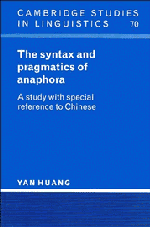1 - A neo-Gricean pragmatic theory and anaphora
Published online by Cambridge University Press: 23 October 2009
Summary
[A] regimented account of language use facilitates a simpler and more elegant description of language structure.
Horn (1988: 115)Introduction
In this book, I shall develop, on the basis of an in-depth analysis of Chinese, a pragmatic theory of anaphora within the neo-Gricean framework of conversational implicature.
Anaphora refers to a relation between two linguistic elements, wherein the interpretation of one (called an anaphor) is in some way determined by the interpretation of the other (called an antecedent) (e.g. Lust 1986a, Wasow 1986). In recent years, anaphora has not only become a central issue in linguistic theory, it has also attracted a growing amount of attention from philosophers, psychologists, cognitive scientists and artificial intelligence workers. It has aroused this interest because, on the one hand, some aspects of anaphora have repeatedly been claimed by Chomsky (1981, 1982a, b, 1986a, 1988, 1991b) to reflect underlying principles of innate Universal Grammar (UG), the biologically determined endowment of the human mind; and on the other hand, anaphora has been shown to interact with various syntactic, semantic and pragmatic factors. It has therefore provided a test case for various competing hypotheses concerning the relationship between syntax, semantics and pragmatics in linguistic theory.
Anaphora clearly involves syntactic, semantic and pragmatic factors. Although it is generally acknowledged that pragmatic factors play an important role in discourse anaphora, it is equally widely held (especially among Government and Binding (GB) theorists) that only syntactic and semantic factors are crucial to intrasentential anaphora.
- Type
- Chapter
- Information
- The Syntax and Pragmatics of AnaphoraA Study with Special Reference to Chinese, pp. 1 - 18Publisher: Cambridge University PressPrint publication year: 1994



